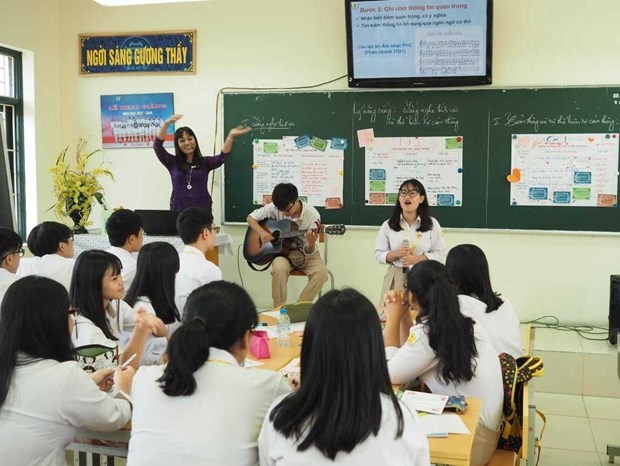Teacher training: No more ‘Chinese whispers’
 A teacher at Victory Primary School assists pupils in conducting scientific experiment (Photo: VNA)
A teacher at Victory Primary School assists pupils in conducting scientific experiment (Photo: VNA)Hanoi (VNA) - Teachers are a decisive factor of education reforms. Given the ongoing reforms in Vietnamese education, insiders have concerned with the quality of teacher training. “How to equip teachers with sufficient knowledge and skills so that they can adapt to the latest education reform?” is the question raised by lots of people, including teachers and leaders of education sector.
‘Chinese whispers’ in teacher training should be avoided
According to statistics by the Ministry of Education and Training, there are 1.16 million kindergarten and school teachers in Vietnam as of October 2018. Of which, 309,770 are kindergarten teachers, and the number of those teaching elementary, secondary and high schools are 395,848; 305,815 and 149,710, respectively.
Like any one in over one million teachers, Tran Thi Quynh Diep, who teaches at Nguyen Trai secondary school in Hai Duong province is counting days until the training course for teachers on the latest education reform.
“The reform this time brings along a lot of changes. We are looking forward to the training courses to get to know more about new teaching contents and methodology”, says Diep.
However, according to Diep, MoET should adopt significant changes in implementing the training courses so that they would be more effective and practical.
Speaking from her 15-year experience as a teacher, Diep says she and her colleagues have attended several training courses for teachers, but they were not so effective.
The situation is attributed to a lot of factors, such as over-theoretical trainers and dull class activities.
“Most of the time we are there just for show. We can also skip some classes that are not so important. It is not because we do not want to learn new things but the programme is not effective. Some teachers even come out of a pocket for other private training courses.” Diep says.
She voices her opinion that MoET should prepare the training course more carefully by improving both trainers and training activities. Besides in-person training, the courses should be delivered online so that teachers could listen directly from the most knowledgeable people on the reforms, instead of multi-layered training which may lead to ‘Chinese whispers’ situation.
 Column chart illustrating the number of teachers in need of training by school levels
Column chart illustrating the number of teachers in need of training by school levels Training content may be developed from the bottom up
Centralisation approach is recommended by numerous directors of municipal and provincial Department of Education and Training.
According to Nguyen Minh Tuong, Director of Phu Tho provincial Department of Education and Training, centralised training allows all teachers to exchange with specialised staff at the central level.
He urges the Ministry of Education and Training to soon deploy the training activities as it is a decisive factor of the new school education curriculum.
However, Director of Da Nang city’s Department of Education and Training Nguyen Dinh Vinh recommends a mixed approach comprising of both online and in-person. “In-person training is more inspiring as meeting trainers, whom teachers are admired, is a nice experience for teachers”, he explains.
Vinh also pointed out shortcomings in current universal training, which is selection of trainees. Excellent teachers in schools are often assigned to attend the training courses, leading to the difference of attending frequency between teachers. “Less-capable teachers have fewer chances to attend the training course. I think it is not effective. My suggestion is that except for core staff, other teachers also need to be sent to training classes on a rotation basis,” Vinh says.
He also recommends the Ministry of Education and Training to develop a consultation centre and data warehouse as a platform for teachers to raise relevant questions. From experiences in Da Nang city, the training should not only from top down but also bottom up, which means teachers are also able to make recommendations from their own practices. “Two-way training will be more effective”, says Vinh.
 Teacher training approaches will be more diverse to meet the requirements of the new curriculum of school education (Photo: Vietnam+)
Teacher training approaches will be more diverse to meet the requirements of the new curriculum of school education (Photo: Vietnam+)Online training will be in place
Given the queries and recommendations by teachers and leaders of local education sectors, Minister of Education and Training Phung Xuan Nha reveals that the teacher training agenda is under development and soon to be deployed.
Training approach will be reformed with online courses available so that the training could reach every school and every teacher. The Ministry will exert efforts to improve the situation of ‘teachers attending classes just for show’ and apply technology to improve effectiveness of training activities.
A data pool and materials will also be developed so that teachers can access from anywhere. In-person training only focuses on queries about the reforms and challenges arising in their practices. The questions will be answered by trainers.
The content of training courses will be reviewed to meet teachers’ demands.
Sharing about the issue, Nguyen Van Minh, President of Hanoi National University of Education, one of eight major pedagogy institutions of Vietnam says, the university has been building an overall school education scheme and a reformed scheme detailing each subjects. The schemes lay a foundation for general pedagogical training in general and teacher training for education reforms in particular.
“Teachers may rest assured that pedagogical institutions have prepared carefully. We will train the trainers and then they will train teachers. The training will be conducted both online and offline. Dialogues will be held to answer teachers’ questions at any time. It is not an easy task but we will make it soon. Teachers should not be so worried about that,” says Minh.-VNA













